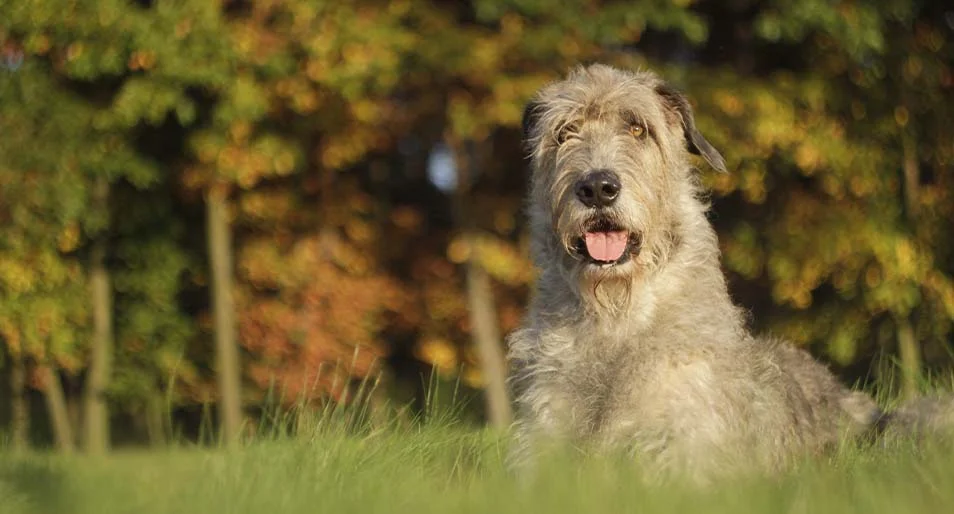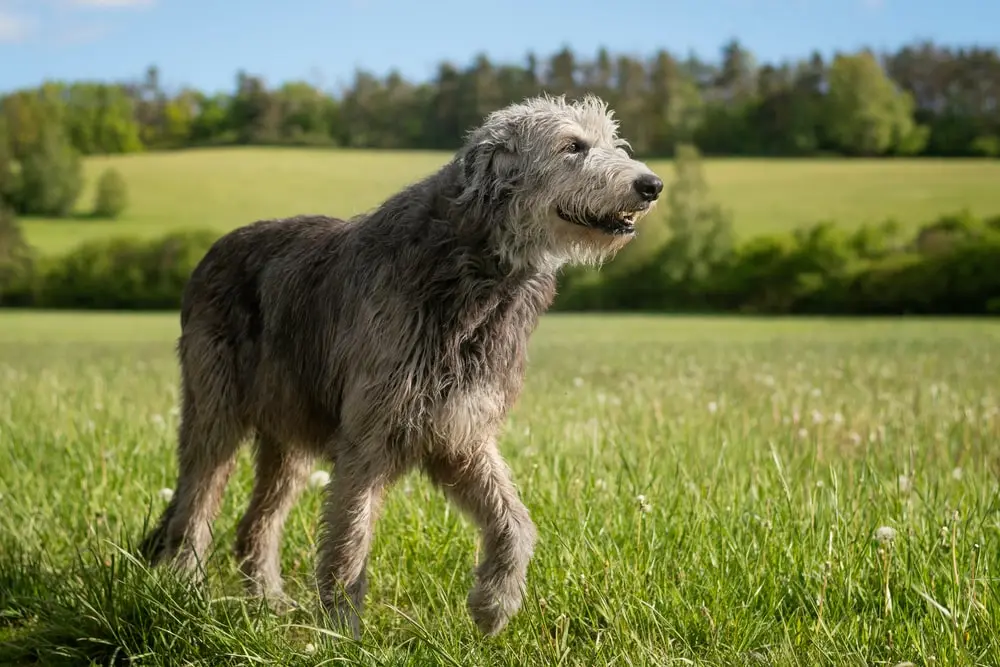BREED SPOTLIGHT
Irish Wolfhound Quick Stats
LIFESPAN:
6 - 8 years
WEIGHT:
105 - 120 lbs
HEIGHT:
30 - 32 inches
DO I SHED?
Yes
Personality:
Calm, dignified, and intelligent
Common Health Problems:
Bloat, heart disease, cancers, and joint disorders
Irish Wolfhound: How Do I Look?
Irish wolfhounds aren’t quite as heavy or massive as the Great Dane, but they are one of the largest sighthounds. These gentle giants have a large, commanding appearance at nearly three feet long at the shoulder. Female Irish wolfhounds are slightly smaller, but even they can weigh as much as 105 lbs.³ They are muscular, graceful dogs with shaggy coats and long muzzles who are beautiful while running or just snuggled on the couch.
Coat Type and Colors
Irish wolfhounds’ fur is double-coated with a soft undercoat topped by a harsh, wiry outer coat. This gives these dogs their characteristic shaggy appearance. You can find these hounds with white, gray, and black markings or a “brindle” colorings. Common colors include:
- Black
- Blue
- Cream
- Gray
- Red
- Silver
- White
Some dogs are brindled with a combination of all these colors, creating a lovely pattern on their large bodies.
Ears
Irish wolfhounds have small and round rose ears, similar to greyhounds. They sit close to the head and droop forward.
Shedding and Grooming
These dogs shed throughout the year so they should be brushed once a week to keep the dirt and loose hair out of their fur. Irish wolfhounds’ fur can be rough on their body, legs, and head but very long on their eyes and chin. They will need to be trimmed and cut regularly. During the summer months, they may benefit from a trip to the groomer so they don’t overheat.
Drooling Level
These pooches aren’t known for drooling except when they’re hungry, excited, or when they’ve finished eating.
Irish Wolfhound: Personality Traits
What My Adoption Bio Would Say:
I enjoy long walks through the woods with my friends. Let’s play a game of hide and seek; I love finding things since hunting is my pastime. When I’m not walking or playing, I love lounging on a fluffy pile of blankets and pillows with my family. Pick me and I’ll be your favorite friend for adventure and snuggles!
Behaviour
Irish wolfhounds are characterized by their calm demeanor and deep affection for their family. If left to their own devices, they can become couch potatoes, but they enjoy playing with others.
Exercise Needs
All hounds require regular, vigorous exercise. Irish wolfhounds enjoy games that include chasing, luring, and retrieving but they don’t particularly enjoy playing independently. Owners should invest in a fenced yard where their wolfhound can run uninhibited with other dogs.
Consider training your dog in athletic training, like lure coursing. As previously mentioned, Irish wolfhounds don’t do well with independent play, so choose activities that engage both their minds and body with you or other pooches.
Is an Irish Wolfhound Good With Other Pets?
Generally, Irish wolfhounds get along well with other pets. Keep in mind that every dog is different so be careful to introduce your hound to other furry family members properly.
Trainability
Irish wolfhounds do best with firm, yet positive training from their owners. They’re highly intelligent dogs who may have a stubborn streak. However, a patient owner will be rewarded by a loyal, obedient dog over time.
Is an Irish Wolfhound Good With Kids?
Despite their size, Irish wolfhounds are extremely gentle creatures who tend to be very protective of children and their households. You’ll be pleasantly surprised how well these hounds mesh with rambunctious kids.
Barking Level
Barking isn’t an Irish wolfhound’s thing; you should only expect this dog to bark if they’re trying to alert you to a stranger — or if their dinner is late.
Irish Wolfhound History
The origin of the Irish wolfhound is shrouded in legend, with the earliest written records dating back to the time of Alexander the Great.⁴ Ancestors of modern Irish wolfhounds were bred to protect domestic animals from wolves — hence their modern name “wolfhound.” Nowadays, Irish wolfhounds are still popular working dogs helping families across Europe and North America on their farms. Their gentle, obedient nature makes them fabulous pets for hound lovers everywhere.
Common Irish Wolfhound Mixes
In love with these shaggy giants? Check out these popular Irish wolfhound mixes:
- Irish Dane: Irish wolfhound and Great Dane mix
- Great wolfhound: Irish wolfhound and great Pyrenees mix
- Irish wolf greyhound: Irish wolfhound and greyhound mix
- Irish mastiff: Irish wolfhound and mastiff mix
- Miniature Irish wolf schnauzer: Irish wolfhound and miniature schnauzer mix
- Irish wolfdoodle: Irish Wolfhound and poodle mix
- Irish wolfsky: Irish Wolfhound and Siberian husky mix
Irish Wolfhound Health Issues
Irish wolfhounds may experience a variety of health issues, including:3,5
- Gastric torsion: Commonly known as bloat, this is a sudden and life-threatening swelling of the abdomen.
- Von Willebrand disease: This is a lifelong bleeding disorder causing blood to not clot properly.
- Cardiomyopathy: This is a decreased ability of the heart to pump blood.
- Liver shunt: An abnormal, congenital connection between the vein, or “shunt,” around the liver.
- Progressive retinal atrophy: This is a slow breakdown of the retina that leads to blindness.
- Osteosarcoma: This is a type of bone cancer.
- Gastrointestinal problems
- Joint issues
The health tests recommended by the American Kennel Club can be conducted regularly to evaluate Irish wolfhounds for hip and elbow dysplasia, heart diseases, and eye issues.³ Be sure to ask your breeder plenty of questions when buying or adopting your dog. If they aren’t honest with you, don’t take the dog home.
Protect your Pets
Even the healthiest of pups can come with unexpected vet costs. Pet insurance can help keep your dog and your bank account happy.
How Pet Insurance Can Help Your Irish Wolfhound
The cost of caring for a dog can add up over their lifetime. Adding dog insurance to your back pocket can help you potentially save thousands of dollars on veterinary care, including prescriptions to keep your Irish wolfhound healthy.
Liver Shunt
Portosystemic shunt, or a liver shunt, is an abnormal connection between the vein or branches that channel blood in and around the liver. Oftentimes, this disorder is genetic and symptoms take time to show. Symptoms include poor muscle development, disorientation, and seizures.⁶ Diagnosis testing takes time, including various forms of blood work, a urine test, a bile test, and digital imaging (either a CT scan or MRI).⁶ A MetLife dog insurance policy may help cover the cost of diagnosis or treatment for liver shunt.1,2
For more information on how pet insurance can help your Irish wolfhound, check out our guide on how pet insurance works. And remember, signing up for dog insurance while your wolfhound is a puppy is smart as it can ensure your dog has coverage before something becomes a pre-existing condition.






